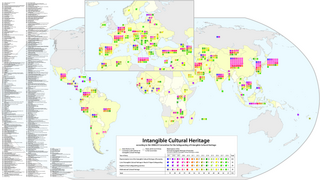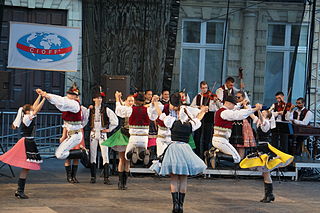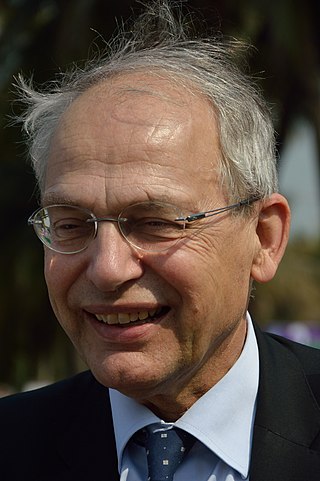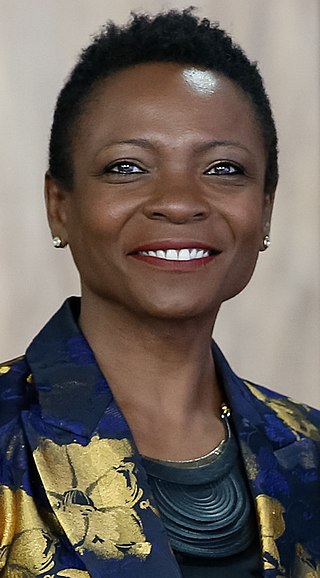
Bridgetown is the capital and largest city of Barbados. Formerly The Town of Saint Michael, the Greater Bridgetown area is located within the parish of Saint Michael. Bridgetown is sometimes locally referred to as "The City", but the most common reference is simply "Town". As of 2014, its metropolitan population stands at roughly 110,000.
The International Council on Monuments and Sites is a professional association that works for the conservation and protection of cultural heritage places around the world. Now headquartered in Charenton-le-Pont, France, ICOMOS was founded in 1965 in Warsaw as a result of the Venice Charter of 1964 and offers advice to UNESCO on World Heritage Sites.
Dame Billie Antoinette Miller, DA, OOC is a Barbadian politician who served as Deputy Prime Minister. Miller is a member of the Barbados Labour Party (BLP).
The Proclamation of Masterpieces of the Oral and Intangible Heritage of Humanity was made by the Director-General of UNESCO starting in 2001 to raise awareness of intangible cultural heritage and encourage local communities to protect them and the local people who sustain these forms of cultural expressions. Several manifestations of intangible heritage around the world were awarded the title of Masterpieces to recognize the value of the non-material component of culture, as well as entail the commitment of states to promote and safeguard the Masterpieces. Further proclamations occurred biennially. In 2008, the 90 previously proclaimed Masterpieces were incorporated into the new Representative List of the Intangible Cultural Heritage of Humanity as its first entries.

Cultural heritage is the heritage of tangible and intangible heritage assets of a group or society that is inherited from past generations. Not all heritages of past generations are "heritage"; rather, heritage is a product of selection by society.
An intangible cultural heritage (ICH) is a practice, representation, expression, knowledge, or skill considered by UNESCO to be part of a place's cultural heritage. Buildings, historic places, monuments, and artifacts are cultural property. Intangible heritage consists of nonphysical intellectual wealth, such as folklore, customs, beliefs, traditions, knowledge, and language. Intangible cultural heritage is considered by member states of UNESCO in relation to the tangible World Heritage focusing on intangible aspects of culture. In 2001, UNESCO made a survey among States and NGOs to try to agree on a definition, and the Convention for the Safeguarding of the Intangible Cultural Heritage was drafted in 2003 for its protection and promotion.

The Blue Shield, formerly the International Committee of the Blue Shield, is an international organization founded in 1996 to protect the world's cultural heritage from threats such as armed conflict and natural disasters. Originally intended as the "cultural equivalent of the Red Cross", its name derives from the blue shield symbol designed by Jan Zachwatowicz, used to signify cultural sites protected by the 1954 Hague Convention for the Protection of Cultural Property in Armed Conflict.

The World Heritage Committee is a committee of the United Nations Educational, Scientific and Cultural Organization that selects the sites to be listed as UNESCO World Heritage Sites, including the World Heritage List and the List of World Heritage in Danger, defines the use of the World Heritage Fund and allocates financial assistance upon requests from States Parties. It comprises representatives from 21 state parties that are elected by the General Assembly of States Parties for a four-year term. These parties vote on decisions and proposals related to the World Heritage Convention and World Heritage List.
Queen's College is a public secondary school in Barbados that was established in 1883. It is a multi-racial school with students drawn from a wide cross-section of the Barbadian community. It comprises eleven departments in which approximately thirty-three subject areas are taught.

Richard Kurin, an American cultural anthropologist, museum official and author, is the Acting Provost and Under Secretary for Museums and Research at the Smithsonian Institution. He is a key member of the senior team managing the world's largest museum and research complex with 6,500 employees and a $1.4 billion annual budget, caring for more than 139 million specimens, artifacts and artworks, working in 145 countries around the globe, hosting some 30 million visitors a year, and reaching hundreds of millions online and through the Smithsonian's educational programs and media outreach. Kurin is particularly responsible for all of the national museums, scholarly and scientific research centers, and programs spanning science, history, art and culture.

UNESCO established its Lists of Intangible Cultural Heritage with the aim of ensuring better protection of important intangible cultural heritages worldwide and the awareness of their significance. This list is published by the Intergovernmental Committee for the Safeguarding of Intangible Cultural Heritage, the members of which are elected by State Parties meeting in a General Assembly. Through a compendium of the different oral and intangible treasures of humankind worldwide, the programme aims to draw attention to the importance of safeguarding intangible heritage, which UNESCO has identified as an essential component and as a repository of cultural diversity and of creative expression.
Ras Akyem is a Barbadian painter. A graduate of the Edna Manley School of Art in Jamaica, his work is heavily influenced by the Rastafari movement and bears resemblance to the paintings of Jean-Michel Basquiat. His work is frequently exhibited alongside that of Ras Ishi Butcher.

The International Council of Organizations of Folklore Festivals and Folk Arts is an international nongovernmental organization (NGO) in Official partnership with UNESCO and is accredited to provide advisory service to the Committee of the UNESCO Convention for the Safeguarding of Intangible Cultural Heritage. CIOFF has 63 full members, 21 associate members and 18 corresponding members worldwide and 3 partner members. Its headquarters are in Confolens in France. Full members are National Sections with the aim to preserve traditional art, to organize Folklore Festivals or similar activities as well as unite voluntary organizations, working in the field of dance, music, costumes, customs and ethnography. The National Sections belong to sectors in the organization according to their geographic location.
Kris Rampersad is a writer, researcher, lecturer, journalist, publisher, activist and advocate from Trinidad and Tobago.

Prof. Dr Hans-Martin Hinz is a German museum professional. From 2010 to 2016 he was President of the International Council of Museums (ICOM).
The Inter-City Intangible Cultural Cooperation Network (ICCN) is the only international organization of local governments and cultural organizations that aim to safeguard the world’s Intangible Cultural Heritage. The ICCN has been working to explore creative and effective policies for the safeguarding of local Intangible Cultural Heritage and its inseparable relation to sustainable local development. Furthermore, we aim to make cultural peace based on mutual understanding formed through intercultural dialogue.

Tonika Sealy-Thompson is a diplomat, academic, social justice and education activist from Barbados. She was appointed ambassador to Brazil in 2019, and also now serves concurrently as Barbados’ Ambassador to Argentina, Chile, Paraguay and Uruguay.
Sheikha Bibi Duaij Al-Jaber Al-Sabah is a cultural and education activist known for her efforts to preserve and promote Kuwait's textile heritage. As the chairperson of the AlSadu Society – Weaving Cooperative, she has spent over a decade advocating for the master weavers, ensuring the continuity of craft traditions.









